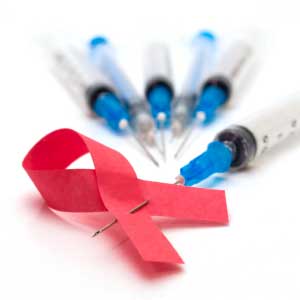The preliminary human trial of an experimental vaccine regiment is anticipated to begin in the second half of 2019, according to a study published on Monday in the journal Nature medicine.
The “broadly neutralising’’ vaccine regiment based on the structure of a vulnerable site on HIV was found to have elicited antibodies in mice, guinea pigs and monkeys that could neutralise dozens of HIV strains from around the world.

The new regiment reflected the approach scientists used to develop an HIV vaccine as they first identify powerful HIV antibodies that can neutralise many strains of the virus.
The researchers had then try to elicit those antibodies with a vaccine based on the structure of the HIV surface protein where the antibodies bind.
The study was led by Peter Kwong, and John Mascola with the National Institute of Allergy and Infectious Diseases (NIAID), part of the National Institutes of Health (NIH) under the U.S. Department of Health and Human Services.
“This elegant study is a potentially important step forward in the ongoing quest to develop a safe and effective HIV vaccine,’’ said NIAID Director, Anthony Fauci.
NIH vaccine scientist, Zhou Tongqing, said that this was a revolutionary discovery since in past three decades, no research produced so good a result that elicit “broad neutralising antibiotics” in so many animal models.
Over the past years, HIV researchers have discovered many powerful, naturally occurring antibodies that can prevent multiple HIV strains from infecting human cells in the laboratory.
About half of people living with HIV make these so-called “broadly neutralising” antibodies, but usually only after several years of infection, long after the virus has established a foothold in the body.
Since scientists have identified and characterised the sites, or epitopes, on HIV where each known broadly neutralising antibody binds, many laboratories are developing HIV vaccine.
The laboratories are developing HIV vaccine candidates based on the structure of these epitopes with the goal of coaxing the immune systems of HIV-negative people to make protective antibodies after vaccination.
The experimental vaccine reported in this study is based on an epitope called the HIV fusion peptide, identified by NIAID scientists in 2016.
The fusion peptide, a short string of amino acids, is part of the spike on the surface of HIV that the virus uses to enter human cells.
According to the scientists, the fusion peptide epitope is particularly promising for use as a vaccine for two reasons.
Firstly, its structure is the same across most strains of HIV, and secondly the immune system clearly “sees” it and makes a strong immune response to it because the fusion peptide lacks sugars that obscure the immune system’s view of other HIV epitopes.
The scientists first designed the immunogens, proteins designed to activate an immune response, using a collection of antibodies that target the fusion peptide epitope, and then tested in mice which immunogens most effectively elicited antibodies to the fusion peptide.
They found that the best immunogen consisted of eight amino acids of the fusion peptide bonded to a carrier that evoked a strong immune response.
To improve their results, the scientists paired this immunogen with a replica of the HIV spike.
The researchers then tested different combinations of injections of the protein plus HIV spike in mice and analysed the antibodies that the vaccine regimens generated.
The antibodies attached to the HIV fusion peptide and neutralised up to 31 per cent of viruses from a globally representative panel of 208 HIV strains.
Based on their analyses, the scientists adjusted the vaccine regimen and tested it in guinea pigs and monkeys.
These tests also yielded antibodies that neutralised a substantial fraction of HIV strains, providing initial evidence that the vaccine regimen may work in multiple species.
The scientists are now working to improve the vaccine regimen, including making it more potent and able to achieve more consistent outcomes with fewer injections.
The researchers also are isolating additional broadly neutralising antibodies generated by the vaccine in monkeys, and they will assess these antibodies for their ability to protect the animals from a monkey version of HIV.
The NIAID scientists will use their findings to optimize the vaccine and then manufacture a version of it suitable for safety testing in human volunteers in a carefully designed and monitored clinical trial.
(Xinhua/NAN)













